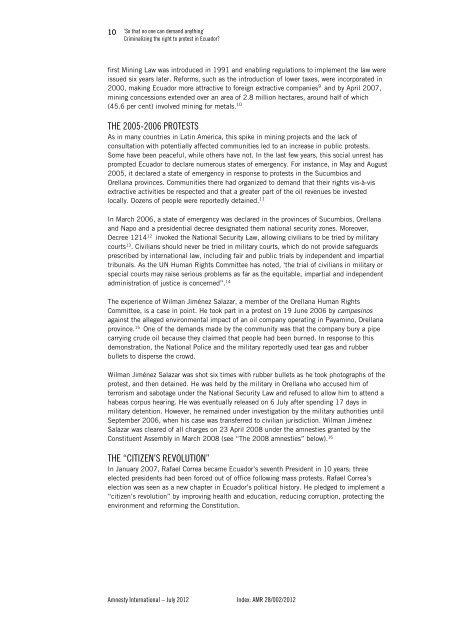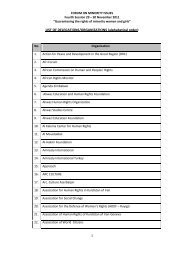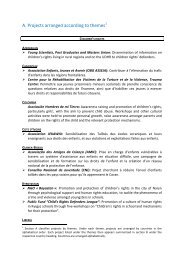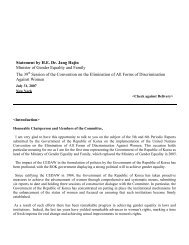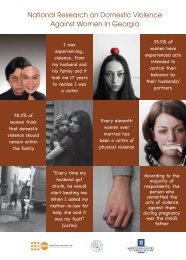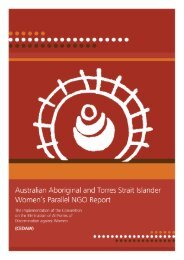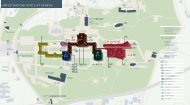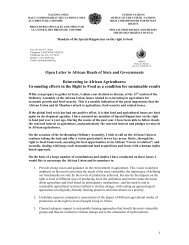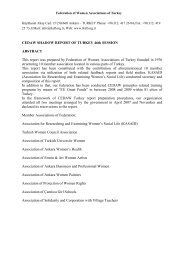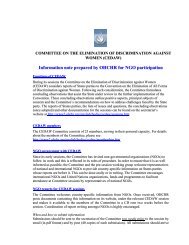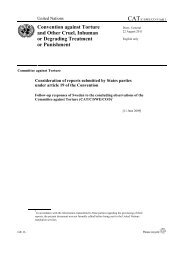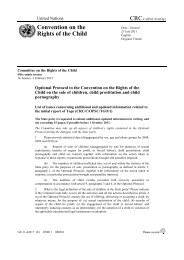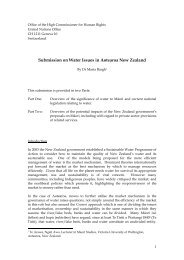'SO THAT NO ONE CAN DEMAND ANYTHING' - Office of the High ...
'SO THAT NO ONE CAN DEMAND ANYTHING' - Office of the High ...
'SO THAT NO ONE CAN DEMAND ANYTHING' - Office of the High ...
Create successful ePaper yourself
Turn your PDF publications into a flip-book with our unique Google optimized e-Paper software.
10‘So that no one can demand anything’Criminalizing <strong>the</strong> right to protest in Ecuador?first Mining Law was introduced in 1991 and enabling regulations to implement <strong>the</strong> law wereissued six years later. Reforms, such as <strong>the</strong> introduction <strong>of</strong> lower taxes, were incorporated in2000, making Ecuador more attractive to foreign extractive companies 9 and by April 2007,mining concessions extended over an area <strong>of</strong> 2.8 million hectares, around half <strong>of</strong> which(45.6 per cent) involved mining for metals. 10THE 2005-2006 PROTESTSAs in many countries in Latin America, this spike in mining projects and <strong>the</strong> lack <strong>of</strong>consultation with potentially affected communities led to an increase in public protests.Some have been peaceful, while o<strong>the</strong>rs have not. In <strong>the</strong> last few years, this social unrest hasprompted Ecuador to declare numerous states <strong>of</strong> emergency. For instance, in May and August2005, it declared a state <strong>of</strong> emergency in response to protests in <strong>the</strong> Sucumbios andOrellana provinces. Communities <strong>the</strong>re had organized to demand that <strong>the</strong>ir rights vis-à-visextractive activities be respected and that a greater part <strong>of</strong> <strong>the</strong> oil revenues be investedlocally. Dozens <strong>of</strong> people were reportedly detained. 11In March 2006, a state <strong>of</strong> emergency was declared in <strong>the</strong> provinces <strong>of</strong> Sucumbios, Orellanaand Napo and a presidential decree designated <strong>the</strong>m national security zones. Moreover,Decree 1214 12 invoked <strong>the</strong> National Security Law, allowing civilians to be tried by militarycourts 13 . Civilians should never be tried in military courts, which do not provide safeguardsprescribed by international law, including fair and public trials by independent and impartialtribunals. As <strong>the</strong> UN Human Rights Committee has noted, ‘<strong>the</strong> trial <strong>of</strong> civilians in military orspecial courts may raise serious problems as far as <strong>the</strong> equitable, impartial and independentadministration <strong>of</strong> justice is concerned”. 14The experience <strong>of</strong> Wilman Jiménez Salazar, a member <strong>of</strong> <strong>the</strong> Orellana Human RightsCommittee, is a case in point. He took part in a protest on 19 June 2006 by campesinosagainst <strong>the</strong> alleged environmental impact <strong>of</strong> an oil company operating in Payamino, Orellanaprovince. 15 One <strong>of</strong> <strong>the</strong> demands made by <strong>the</strong> community was that <strong>the</strong> company bury a pipecarrying crude oil because <strong>the</strong>y claimed that people had been burned. In response to thisdemonstration, <strong>the</strong> National Police and <strong>the</strong> military reportedly used tear gas and rubberbullets to disperse <strong>the</strong> crowd.Wilman Jiménez Salazar was shot six times with rubber bullets as he took photographs <strong>of</strong> <strong>the</strong>protest, and <strong>the</strong>n detained. He was held by <strong>the</strong> military in Orellana who accused him <strong>of</strong>terrorism and sabotage under <strong>the</strong> National Security Law and refused to allow him to attend ahabeas corpus hearing. He was eventually released on 6 July after spending 17 days inmilitary detention. However, he remained under investigation by <strong>the</strong> military authorities untilSeptember 2006, when his case was transferred to civilian jurisdiction. Wilman JiménezSalazar was cleared <strong>of</strong> all charges on 23 April 2008 under <strong>the</strong> amnesties granted by <strong>the</strong>Constituent Assembly in March 2008 (see “The 2008 amnesties” below). 16THE “CITIZEN’S REVOLUTION”In January 2007, Rafael Correa became Ecuador’s seventh President in 10 years; threeelected presidents had been forced out <strong>of</strong> <strong>of</strong>fice following mass protests. Rafael Correa’selection was seen as a new chapter in Ecuador’s political history. He pledged to implement a“citizen’s revolution” by improving health and education, reducing corruption, protecting <strong>the</strong>environment and reforming <strong>the</strong> Constitution.Amnesty International – July 2012 Index: AMR 28/002/2012


